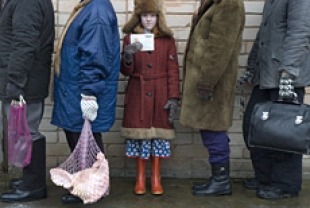Disco and Atomic War won the Best Documentary Prize at the Warsaw International Film Festival. In witty and clever ways, it presents the zigzags of the Cold War as experienced by citizens of Estonia, a country dominated and controlled by the Soviet Union but open to Western media. Through television and radio, Estonians were exposed to an alternative future — the money-grubbing capitalism of the Ewings on Dallas and the sexy movements of disco dancing. Filmmakers Jaak Kilmi and Kiur Aarma grew up in Tallinn, the capital of Estonia, during the 1980s and include many photographs of themselves and their peers enjoying Western culture juxtaposed with the Soviet Union's futile attempts to shut down or block signals from the television antenna in Finland, which broadcast into Estonians homes; when that didn't work the totalitarians tried to create soap operas to rival Dallas — another failure. (It is interesting to note that the Chinese Communists have similarly tried to eradicate genuine Tibetan culture by creating their own rival festivals and operas in that occupied country; see Tibet in Song.)
Disco and Atomic War makes the valid point that the West won the Cold War not with military weapons and spy superiority, but by the "soft power" of media propaganda espousing the values of consumerism along with Kojak, Knight Rider, and Star Wars. Our biggest export right now is not the things made in our factories or the food grown on our farms; it is the mass-produced products of pop culture — movies, TV programs, music, and computer software. Like it or not, this is what America has to offer the world.

